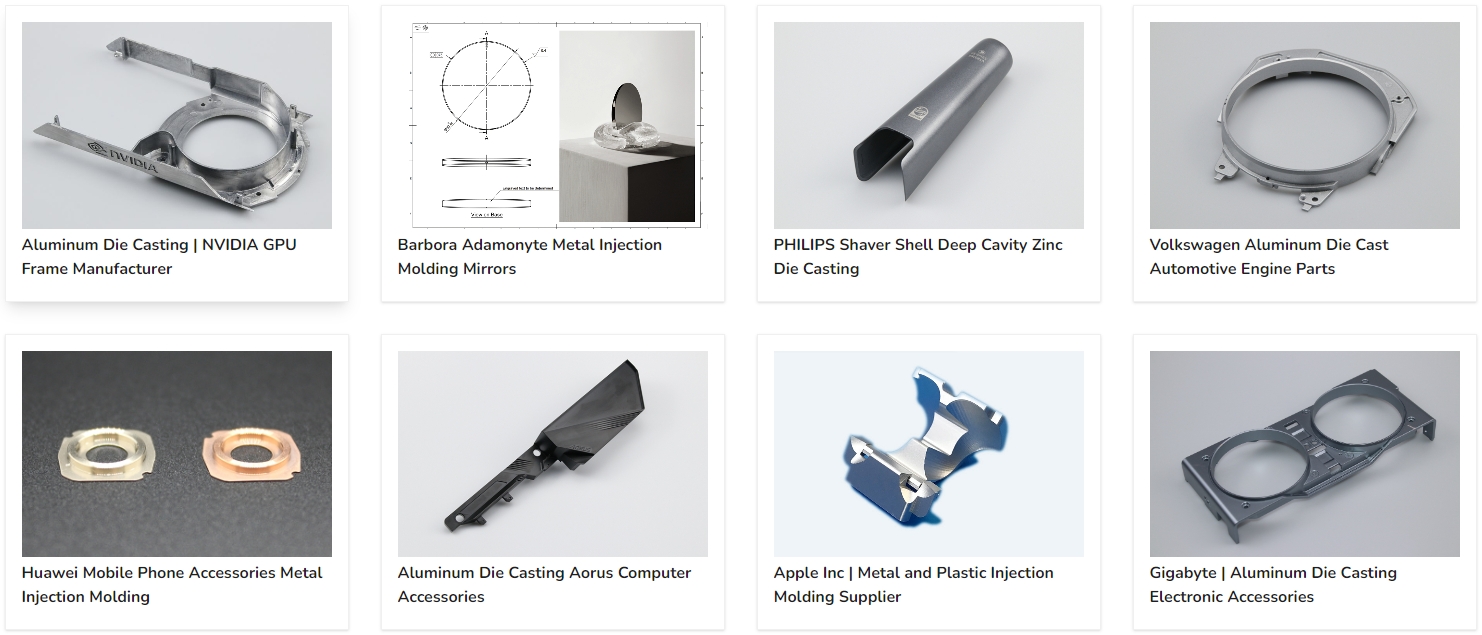Aluminum Die Casting Solar Energy Heat Sinks: High-Pressure Die Cast Supplier
What Is Aluminum Die Cast Heat Sinks?
Aluminum die-cast heat sinks are pivotal in enhancing energy efficiency across various industries, focusing on the energy sector. These heat sinks are precision-engineered components that dissipate excess heat from electronic devices and power systems. In the context of the energy industry, their significance cannot be overstated. Their design and material composition, which often includes high-quality aluminum alloys, enable them to manage heat in power electronics efficiently, ensuring the longevity and reliability of energy equipment.
In the energy industry, where power generation and distribution are critical, aluminum die-cast heat sinks are deployed in many applications. For instance, power converters and inverters help maintain optimal operating temperatures, thus improving energy conversion efficiency. Their high precision and thermal conductivity, often exceeding 200 W/m·K, ensure these heat sinks effectively dissipate heat, reducing energy losses. Moreover, they find use in LED lighting systems, where maintaining consistent temperatures is vital for performance and durability, making them essential for energy-efficient lighting solutions.
Aluminum die-cast heat sinks are also integral in renewable energy sources like wind and solar power systems. They assist in managing the heat generated during power conversion and storage, increasing the overall efficiency of these sustainable energy solutions. These heat sinks help advance the energy industry towards a more sustainable and eco-friendly future by efficiently regulating temperatures and ensuring equipment reliability.
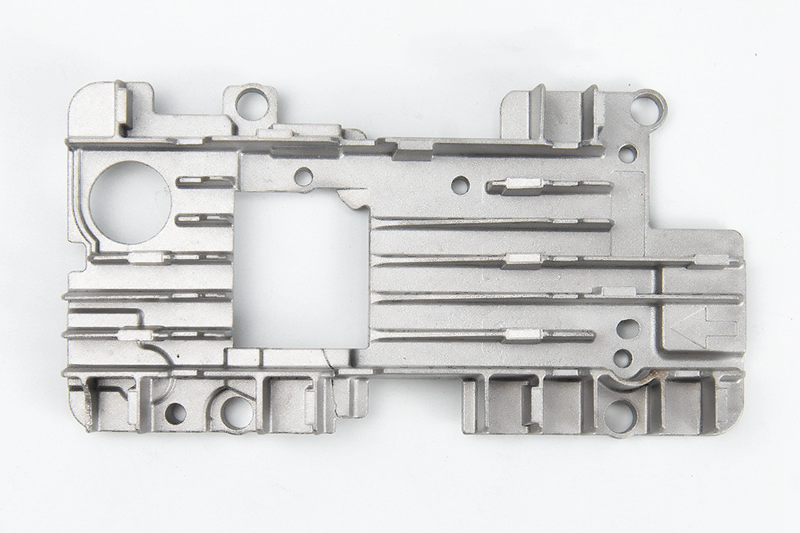
Aluminum Die Castings in Energy industry
Die casting, a prominent manufacturing process in producing precise metal components, plays a crucial role in the energy industry. Its versatility, speed, and precision are indispensable in creating parts integral to various energy applications, enhancing the sector's overall efficiency. From power generation to distribution and energy-efficient equipment, die casting's contributions are undeniable.
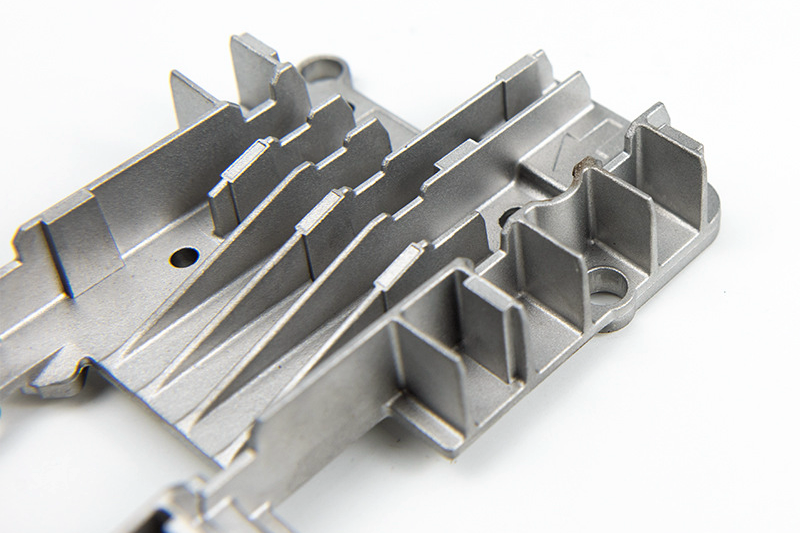
In the energy industry, die casting finds widespread use in manufacturing critical components, such as enclosures for electrical and electronic equipment. These enclosures ensure the protection and insulation of sensitive energy equipment, safeguarding them from environmental factors and electromagnetic interference. Die casting offers high-precision production, guaranteeing that these enclosures meet exact specifications and maintain the necessary tolerances to secure the functionality of energy systems.
Furthermore, die casting extends to producing components like heat sinks, motor housings, and connectors for energy-efficient devices. These components are designed with precision to optimize heat dissipation, ensuring the reliability and longevity of power electronics. With the energy industry's growing emphasis on energy conservation and sustainability, die casting is pivotal in creating lightweight and high-strength components that contribute to more energy-efficient systems, driving progress in the sector.
Die Cast Heat Sinks Manufacturing
Precision is paramount in producing die-cast heat sinks, with stringent requirements for optimal thermal management. To achieve the highest efficiency, the industry standards demand precision with tolerances as tight as ±0.02 mm in critical areas. This precision is vital in applications within the consumer electronics and lighting solutions sectors, where every fraction of a degree matters.
Moreover, material selection plays a pivotal role. Die-cast heat sinks often utilize aluminum alloys due to their excellent thermal conductivity. In this context, high-pressure die casting is employed, with machines exerting pressures ranging from 1500 to 4500 tons to ensure the material fills intricate molds flawlessly. In the context of the telecommunications industry, where compact and efficient heat sinks are vital, these stringent requirements are essential.
Additionally, surface finish is crucial not only for functionality but also for aesthetics. Heat sinks must meet a surface roughness standard of Ra 3.2 to Ra 6.3 micrometers. This level of smoothness not only improves heat transfer but also caters to industries like power tools, where durability and appearance converge. These specific values and requirements in die-cast heat sink manufacturing exemplify the precision and expertise that Neway consistently delivers across diverse industries, setting new benchmarks in thermal management solutions.
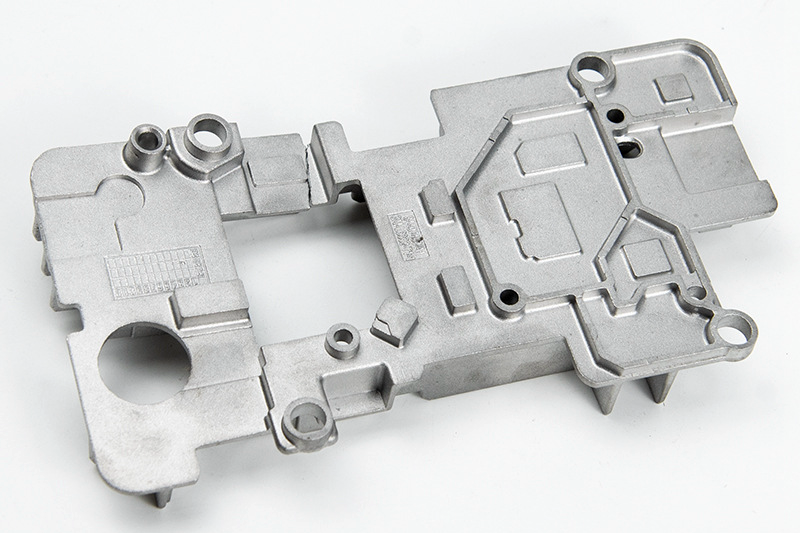
Die Cast Vs. CNC Machining
Die casting offers several distinct advantages over CNC machining for producing heat sinks, particularly in the context of Neway's expertise in precision casting services. Firstly, die casting allows for a high level of precision and consistency. Precision casting, such as die casting, can achieve extremely tight tolerances, often down to a few thousandths of an inch. This level of precision is crucial for heat sinks, as even slight deviations can impact their thermal performance. CNC machining, while accurate, may need to match the precision at the exact cost consistently.
Secondly, die casting is highly efficient and cost-effective in mass production. Heat sinks are frequently used in industries like Consumer Electronics and Telecommunication, where large quantities are required. Die casting enables the production of complex, intricate designs with minimal post-processing, reducing production time and costs. In comparison, CNC machining may require more material removal and longer processing times, making it less cost-effective for high-volume manufacturing.
Lastly, die casting offers superior material utilization. The process minimizes material waste using a closed-loop system, where excess material is recycled. This sustainability factor can be especially appealing in industries focused on environmentally friendly practices, such as Lighting Solutions and Power Tools. In contrast, CNC machining generates more waste due to material removal, making it less eco-friendly. Ultimately, die casting's precision, efficiency, and material utilization make it a favorable choice for producing heat sinks, mainly when catering to Neway's industries of expertise.
Die Cast Vs. Sand Cast
Die casting offers several critical advantages over sand casting in producing heat sinks, particularly in Neway's precision casting services. Firstly, die casting provides a level of precision that is difficult to achieve with sand casting. Like die casting, intricate and highly detailed heat sink designs can be reproduced accurately in precision casting. This precision is crucial, especially in industries like Consumer Electronics and telecommunications, where even minor deviations in heat sink design can impact the overall performance of electronic devices. Due to its inherent nature, sand casting offers a different level of precision.
Secondly, die casting is known for its efficiency and rapid production capabilities. Heat sinks are frequently needed in large quantities in industries like Lighting Solutions and Power Tools. Die casting is highly suitable for mass production because it enables the creation of complex heat sink designs with minimal post-processing. Sand casting, on the other hand, is generally a slower and more labor-intensive process, which may need to be more cost-effective and efficient for high-volume manufacturing.
Lastly, die casting typically yields heat sinks with a smoother surface finish. It is imperative in industries such as Consumer Electronics and Telecommunication, where aesthetics and thermal conductivity are critical. The smoother finish of die-cast heat sinks promotes better heat dissipation and can enhance the overall appearance of electronic devices. Sand casting often results in a rougher surface that may require additional finishing, making it less favorable in applications where a polished look is essential.
Benefits of Die Cast Heat Sinks
Aluminum die-cast heat sinks offer many benefits, making them an excellent choice, especially in industries such as Consumer Electronics, Telecommunication, and Lighting Solutions. Firstly, aluminum's exceptional thermal conductivity is a standout advantage. Aluminum is an excellent heat conductor, allowing heat sinks to rapidly dissipate heat from electronic components. This property is critical in industries where thermal management is crucial, ensuring that electronic devices remain cool and function optimally. In precise terms, aluminum boasts a thermal conductivity of approximately 237 W/m·K, ideal for efficient heat dissipation.
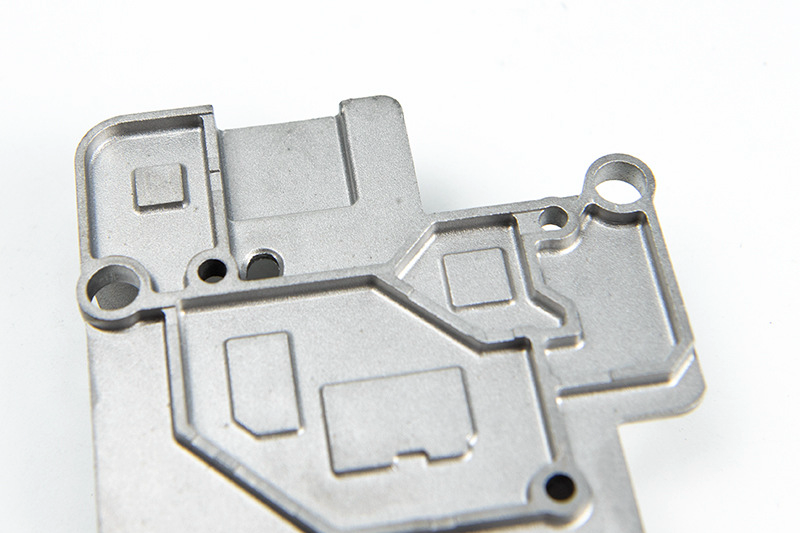
Secondly, aluminum die-cast heat sinks are lightweight yet robust. The lightweight nature of aluminum helps reduce the overall weight of electronic devices, a significant advantage in industries such as E-Mobility and Aerospace, where weight savings are paramount. Additionally, aluminum's inherent durability ensures that the heat sinks can withstand the rigors of various applications. This combination of lightweight and robustness is highly desirable, particularly in applications where performance and durability are essential.
Lastly, aluminum is corrosion-resistant and valuable in environments with varying conditions, such as outdoor lighting solutions. Aluminum's natural oxide layer protects against corrosion, enhancing the longevity of heat sinks. This corrosion resistance is vital in industries like Lighting Solutions, where products are often exposed to the elements.
Die Cast Heat Sinks Case Study
Creating powder-coated ADC12 Aluminum Die Cast thin wall Heat Sinks is a meticulous process that combines precision engineering with advanced coating techniques. Neway, a leader in precision casting services, excels in this endeavor. This three-paragraph explanation will outline the production steps for these heat sinks.
ADC 12 Aluminum Die Cast Heat Sinks
In the first step, ADC12 Aluminum is carefully prepared. It undergoes a melting and die-casting process, forming the initial shape of the heat sink. What sets Neway apart is the extraordinary precision it achieves. The thin wall design, with tolerances as tight as 0.4mm, is critical for efficient heat dissipation. This level of precision ensures that the heat sink is functional and ideally suited for applications in power tools, where thermal management is paramount.
Once the casting is complete, the heat sinks move on to the powder coating phase. Neway utilizes an electrostatic spray process, applying a thermoset powder coating with a thickness of 50-100 microns. This step ensures that the heat sinks are not only thermally efficient but also resistant to environmental factors and corrosion. This level of detail and quality in production exemplifies Neway's commitment to excellence, making these heat sinks ideal for use in lighting solutions and consumer electronics, where durability and performance are paramount.
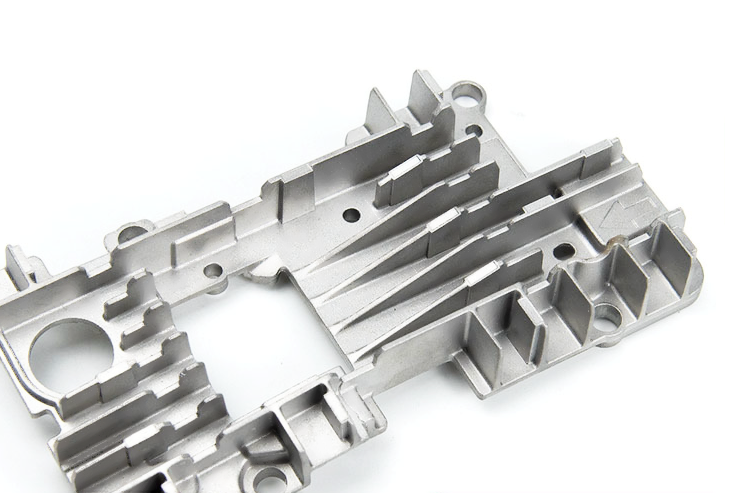
Die Cast Challenges And Solutions
Material Properties and Thin Walls:
Challenge: ADC12 aluminum, known for its excellent heat conductivity, presents challenges due to its high melting point. Working with such material for thin-walled components can result in warping or distortion.
Solution: Neway's engineers leverage die-casting expertise to overcome these hurdles. By carefully controlling the die-casting process, they ensure the material remains within its optimal temperature range. Precision is paramount, as even slight deviations can affect the final product. Neway's advanced tools and techniques, such as optimized injection parameters and temperature control, are essential in preserving the structural integrity of the 0.4mm thin walls.
Surface Finish and Powder Coating Adhesion:
Challenge: A smooth surface finish on thin-walled components is essential for subsequent powder coating. A rough surface can compromise the adhesion of the coating, leading to defects.
Solution: Neway's engineers employ specialized finishing techniques to minimize surface roughness. They ensure the surface is smooth and uniform through meticulous post-processing and refining. It enhances the adhesion of the powder coating, resulting in a durable and visually appealing finish.
High Precision Requirements:
Challenge: Heat sinks are critical in dissipating heat, and precision is vital. Meeting tight tolerances is challenging, especially with components as thin as 0.4mm.
Solution: Neway's commitment to precision is exemplified through its state-of-the-art CNC machining capabilities. These machines operate incredibly accurately, ensuring the heat sinks meet precise specifications. Tolerances as low as 0.02mm are achieved, guaranteeing that these components are finely tuned for their heat-dissipating function.
Powder Coating Uniformity:
Challenge: Powder coating requires a consistent and even thickness. Achieving this uniformity on intricate, thin-walled structures can be demanding.
Solution: Neway's approach to powder coating is automated and controlled. An electrostatic spraying process enhances efficiency and guarantees an even coating thickness. This level of uniformity enhances the appearance and corrosion resistance of the heat sinks.
Neway's Expertise As Die Cast Supplier
Neway excels as a brand-trusted die-cast supplier, offering a wealth of expertise in precision casting services. With a commitment to quality and innovation, we provide a wide range of die-casting techniques, including high-pressure die casting, gravity casting, sand casting, and investment casting, all tailored to meet the unique needs of various industries.
